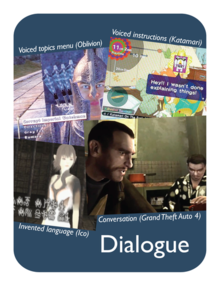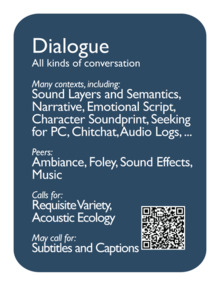Difference between revisions of "Dialogue"
ValterAlves (Talk | contribs) m |
ValterAlves (Talk | contribs) m |
||
| Line 20: | Line 20: | ||
[[Dialogue]] consists all forms of discourse presented along the game. | [[Dialogue]] consists all forms of discourse presented along the game. | ||
| − | [[Dialogue]] is instrumental in communicating the story ([[Narrative]]), aspects of the [[Gameplay]], what the characters think ([[ | + | [[Dialogue]] is instrumental in communicating the story ([[Narrative]]), aspects of the [[Gameplay]], what the characters think (e.g. [[Thoughts]]), their state of mind (e.g. [[Unaware NPC]], [[Suspicious NPC]], [[Seeking for PC]]), and their feelings (other messages contributing to the [[Emotional Script]]). |
[[Dialogue]] is usually associated to characters – and it can even constitute an important element of their [[Character Soundprint]] – but it can also have other sources in some cases of [[Narrator]] and [[Helper Voice]]. | [[Dialogue]] is usually associated to characters – and it can even constitute an important element of their [[Character Soundprint]] – but it can also have other sources in some cases of [[Narrator]] and [[Helper Voice]]. | ||
Revision as of 12:40, 18 October 2011

|

| |
| The card's front face | The card's back face |
Contents
Synopsis
| All kinds of conversation. |
Relationships
Many contexts, including:
Sound Layers and Semantics File:M385px-SoundLayersAndSemantics-front-v20.png, Narrative ![]() , Emotional Script
, Emotional Script ![]() , Character Soundprint
, Character Soundprint ![]() , Seeking for PC
, Seeking for PC ![]() , Chitchat
, Chitchat ![]() , Audio Logs File:M385px-AudioLogs-front-v20.png, ....
, Audio Logs File:M385px-AudioLogs-front-v20.png, ....
Peers:
Ambiance ![]() , Foley
, Foley ![]() , Sound Effects
, Sound Effects ![]() , Music
, Music ![]() .
.
Calls for:
Requisite Variety File:M385px-RequisiteVariety-front-v20.png, Acoustic Ecology ![]() .
.
May call for:
Subtitles and Captions ![]() .
.
Description
Dialogue consists all forms of discourse presented along the game.
Dialogue is instrumental in communicating the story (Narrative), aspects of the Gameplay, what the characters think (e.g. Thoughts), their state of mind (e.g. Unaware NPC, Suspicious NPC, Seeking for PC), and their feelings (other messages contributing to the Emotional Script).
Dialogue is usually associated to characters – and it can even constitute an important element of their Character Soundprint – but it can also have other sources in some cases of Narrator and Helper Voice.
Dialogue can be implemented through actual Voice Acting (and possibly Dubbing). Yet, there are noticeable cases in which designers decided not to have actual voicing of Dialogue and opted to have Subtitles and Caption instead. Subtitles and Caption may also be pertinent, considering that not all players may be familiar with the language(s) used, and also the ear impaired.
Dialogue may also be used as instrument to enrich a confer more liveness to an Acoustic Ecology, for instance by "allowing" NPC to talk to each other (e.g Chitchat) or giving voice to a crowd.
One aspect that tends to be more noticed in Dialogue than in other Sound Layers (Foley, Sound Effects, Ambiance, and Music) is the need for Variety, most probably because repetition is perceived as less plausible.
Examples
  Deadly Premonition: In this game Dialogues add a lot to the experience, not only by the contents of the discourse but also by the intonations and general Aesthetics of the conversations.
|








